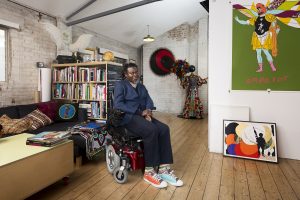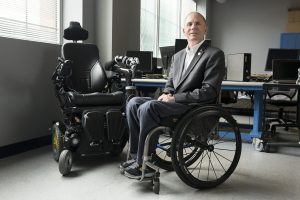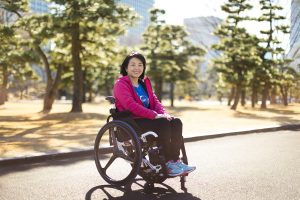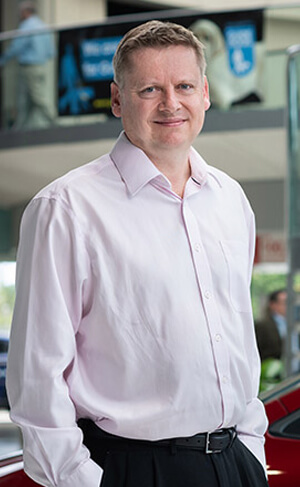International Study Reveals How Outdated Technology Causes Pain and Problems for Wheelchair Users
- International study for the Toyota Mobility Foundation finds that nine out of 10 wheelchair users in the UK, USA, Japan, Brazil and India experience pain from their mobility device.
- People with lower-limb paralysis, around the world, are being encouraged to take part in a global conversation about the types of mobility technology innovations they would like to see, using the hashtag #MyMobilityUnlimited.
- The Toyota Mobility Foundation’s $4 million challenge will drive and reward the development of new personal mobility devices that use intelligent systems and technologies
Data from a new international study of wheelchair users by ComRes on behalf of the [1] Toyota Mobility Foundation highlights the need for investment and innovation in the development of technologies to help people with limited mobility.
The Toyota Mobility Foundation, in partnership with Nesta’s Challenge Prize Centre, commissioned the research to better understand the experiences of wheelchair users as part of the Mobility Unlimited Challenge. The Toyota Mobility Foundation launched the $4 million global challenge in November 2017, with the aim of changing the lives of people with lower-limb paralysis.
The Challenge is seeking teams around the world to create technology that can radically improve the mobility and independence of people with paralysis. It will drive and reward the development of personal mobility devices incorporating intelligent systems and solutions. These could include anything from exoskeletons, artificial intelligence and machine learning, to cloud computing and batteries.
The research, which polled wheelchair users in the UK, US, Japan, India and Brazil, found that nine out of 10 (89 per cent) have experienced pain and discomfort as a result of their mobility devices. Forty-five per cent say they experience back pain at least once a day; 31 per cent say they suffer shoulder pain at least once a day; 29 per cent say they have neck pain at least once a day; and 22 per cent say they experience constant back pain.
The study reveals that almost half (49 per cent) of the number of people who use wheelchairs have needed assistance when travelling, while 43 per cent say they have been unable to find an accessible toilet when they needed one. Furthermore, 31 per cent of wheelchair users report having to wait for multiple buses or trains to pass before one had space to accommodate them, while nearly a quarter (23 per cent) say they have been declined entry to public transport.
The survey found that nearly a third (30 per cent) of wheelchair users say they have felt frustrated because they design of their mobility device felt outdated. Exploring the kinds of improvements that would be most helpful, the top five suggestions it received were devices that allowed wheelchair users to:
- Move around faster (41 per cent)
- Perform regular day to day tasks more easily (37 per cent)
- Feel more relaxed and comfortable with a device that is more natural to use and like an extension of themselves (37 per cent)
- Feel more confident and able to socialise and meet with friends (34 per cent)
- Enjoy a sense of spontaneity, freedom and independence (32 per cent)
The Challenge encourages a user-centred approach and is inviting people with lower-limb paralysis across the world, to take part in a global conversation about the types of mobility technology innovations they would like to see, using the hashtag #MyMobilityUnlimited. The suggestions generated will be used to inspire entrants to create technologies which directly address the issues faced by users day-to-day.
Ryan Klem, Director of Programs for Toyota Mobility Foundation, said: “This research expresses the urgent need for innovation in this area. It’s surprising that with all of the technology we have today, we still have people in constant pain as a result of their mobility devices. The comments we are receiving through social media show the kinds of developments that people want to see and we hope the Challenge will result in genuinely life-changing technologies.”
Charlotte Macken of Nesta’s Challenge Prize Centre, said: “While the focus of this Challenge is lower-limb paralysis, we expect that the technology developed as a result will be transferable and have the potential to improve the lives of a much wider group of people.
“This Challenge is about making an impact, and for that reason we needed to narrow the focus. However, we recognise that people have a wide range of mobility needs and hope to be able to help them too.”
Around the world, millions of people have lower-limb paralysis. Most commonly caused by strokes, spinal cord injury and multiple sclerosis. While there are no statistics on paralysis worldwide, the World Health Organization estimates there are between a quarter and half a million new cases of spinal cord injury globally every year.
Entries for the Challenge close on 15 August 2018, and the winners will be revealed in Tokyo in 2020.
Watch the Mobility Unlimited launch film here to understand our vision.
For more information please visit mobilityunlimited.org
ENDS
[1] Currently use a wheelchair or have used one for at least six months in the last five years.





